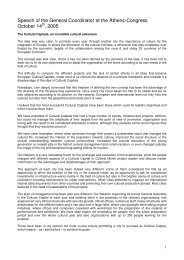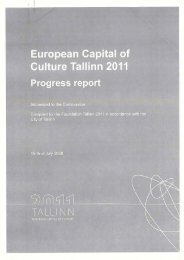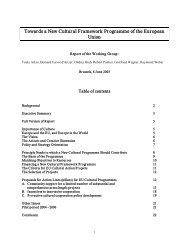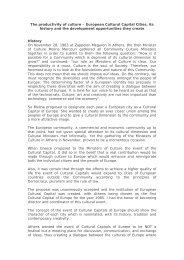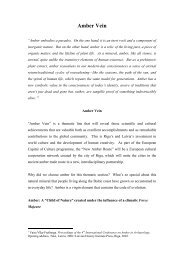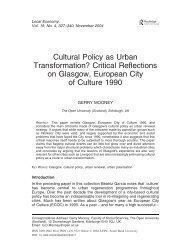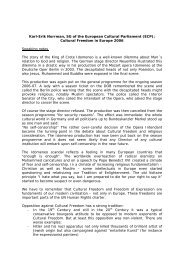patras 2006 - Documentation Centre on European Capitals of ...
patras 2006 - Documentation Centre on European Capitals of ...
patras 2006 - Documentation Centre on European Capitals of ...
You also want an ePaper? Increase the reach of your titles
YUMPU automatically turns print PDFs into web optimized ePapers that Google loves.
Β.∆ΡΑΜΑΤΟΠΟΙΗΜΕΝΗ ΠΟΙΗΣΗ –Σωτήρης Χατζάκης: Περσεφόνη του Γιάννη Ρίτσου1η Μαΐου <str<strong>on</strong>g>2006</str<strong>on</strong>g> ΠτωχοκοµείοΟ µονόλογος του Γιάννη Ρίτσου «Περσεφόνη» τοποθετεί τον αρχαίο µύθο στο σύµπαν του ποιητή,όπου οι αποχρώσεις, οι αντανακλάσεις και τα ηµιτόνια ορίζουν έναν εύθραυστο, υπαινικτικό λόγο.Το σκοτάδι και το φως, η άνοδος και η κάθοδος, ο έρωτας, ο θάνατος σε συζεύξεις µεγάλης ακρίβειας, προσφέρουνένα κείµενο χαρακτηριστικό της ευγένειας και της αµφισηµίας του ποιητή.Θεατρική µεταφορά-Σκηνοθεσία-ΜουσικήΕπιµέλεια: Σωτήρης ΧατζάκηςΒοηθός Σκηνοθέτη: Αγγέλα ΒακάληΣκηνικός χώρος-Κοστούµια: Έρση ∆ρίνηΦωτισµοί: Αντώνης ΠαναγιωτόπουλοςΣτο ρόλο της Περσεφόνης η Όλια Λαζαρίδου∆εκέµβριος 1965 – ∆εκέµβριος 1975: Σε µία µακράπερίοδο ραγδαίων πολιτικών εξελίξεων µεαφετηρία την ήττα του κοµµουνιστικού κινήµατος(εµφύλιος πόλεµος,∆εκέµβριος 1944), ο ποιητήςτης Ρωµιοσύνης παρακολουθεί, κατά τη διάρκειατης δεκαετίας 1965-1975, τη χώρα του να βυθίζεταισε καινούριες επικίνδυνες περιπέτειες... Ποιητήςαπόλυτα προσηλωµένος στο πολιτικό του όραµα,από τα πρώτα κιόλας σκιρτήµατα του πληθωρικούτου λυρισµού, εκτοπίζεται για άλλη µία φορά στα«καθαρτήρια» της εξορίας: Γυάρος,Λέρος, Σάµος.Βιώνοντας σε αυτή τη συγκυρία τον εαυτό του«σαν ένα κοµµάτι της ανθρωπότητας που τονπεριστοιχίζει µε τους καηµούς της, τους πόνουςτης, το µεγαλείο της, τους εξευτελισµούς της»,ο Γιάννης Ρίτσος περιδιαβαίνει το πληγωµένοαπό τη φυµατίωση κορµί του στους «Παρθενώνεςτου Ελληνισµού» -έτσι όπως τουλάχιστοναποκαλούνταν τα στρατόπεδα εξορίας απότο πολιτικό κατεστηµένο της εποχής. Σε αυτότο σκηνικό του θανάτου, το δέντρο της ποίησήςτου εξακολουθεί να τρέφεται αστείρευτα απότη µνήµη, προσεγγίζοντας την ιστορία ως πεδίοδραµατικών συγκρούσεων. Πλην όµως, σε αυτάτα ποιήµατα που αντικαθρεφτίζουν τηνκαθηµαγµένη µεταπολεµική εποχή, ο θάνατοςέχει πάντα ανθρώπινη ταυτότητα. Τον παλµόαυτής της ατµόσφαιρας αφουγκράζεται καιδιηθίζει ο δηµιουργός της 4ης διάστασης,ότανσυνθέτει το σχοινοτενή µονόλογο της Περσεφόνης. Σε µίαδιαλεκτική προσέγγιση της ιστορίας µετουσιώνει το µύθο τηςαρπαγής της Περσεφόνης από τον Άδη, σε αρχέτυπο πουαπεικονίζει την προσωπική και καθολική τραγωδία, την αέναη,δηλαδή, πάλη των δυνάµεων του φωτός και του σκότους.Εκφράζοντας αυτή την αντίληψη, ο Ρίτσος αναδοµείκαι ανασυνθέτει τα συστατικά του µύθου, ανάγοντάς τασε µία 4η, άχρονη και άυλη, δηλαδή, διάσταση, στην οποίατα δραµατικά υποκείµενα µπορούν να λειτουργήσουν ωςπερσόνες που υποδύονται ρόλους συµβολικούς και κατ’επέκταση διαχρονικούς.Σε αυτό το πλαίσιο, ο ποιητής, καταφέρνει να αναδείξει ταµυθολογικά µοτίβα στη σφαίρα του καθολικού, φωτίζοντάςτα πολυπρισµατικά και χρωµατίζοντάς τα ανεξίτηλα από τοβαθυστόχαστο και πολυκύµαντο λυρισµό του.Σύµφωνα, λοιπόν, µε το µονόλογο της Περσεφόνης,η µοναδική βεβαιότητα που δεσπόζει στον «κάτω κόσµο»είναι η σιωπή ενός απέραντου νεκροταφείου ονείρων, όπουακόµη και η θάλασσα µε τις «εναλλασσόµενες διαθέσειςτης... λαµποκοπάει µαρµαρωµένη», βουβή και ακύµαντη.Εξάλλου, στην «πολιτεία» της απέραντης σιωπής, οι υπήκοοιδεν καταβάλλουν ποτέ προσπάθεια να δουν, γιατί απλά τοσκοτάδι είναι «µαύρο, στιλπνό, αναλλοίωτο, χωρίςαποχρώσεις». Απεναντίας, απαλλαγµένοι από το «αβάσταχτοφως» παραδίνονται στην τυραννία του σκότους και έχουνσαν µοναδική παρηγοριά να µουρµουρίζουν στα µνηµόσυνατων ονείρων τους «διφορούµενα λόγια, παρακλήσειςκαι ξόρκια». Προεκτείνοντας αυτήν την αλληλουχία,η Περσεφόνη ως δραµατικό υποκείµενο, έρχεται σαν έναςεπιπλέον κρίκος, να προστεθεί στην ατελείωτη αλυσίδα τηςφθοράς. Παρασυρµένη από τη γοητεία του Άρχοντα τουΣκότους, καθηλώνεται στη φυλακή που η µοίρα τηνκαταδίκασε να ζει. Ανήµπορη να ορίσει την ύπαρξή της,υποσιτίζεται µε την ανάµνηση όσων αγάπησε και ζει µε τηνψευδαίσθηση ενός έρωτα, που δεν είναι τίποτε άλλο, παράένας καταναγκασµός, µία διαστροφή της αγάπης. Μετά όµως,από τη µακρόχρονη ακούσια συνεύρεσή της µε τον Άδη,η ψυχή της ενδίδει στην πολιορκία της νύχτας και βυθίζεταιστο σκοτάδι που τώρα απλώνεται «ακέραιο, παρηγορητικό,αναµάρτητο». Συµβιβασµένη µε τη µοίρα της, απεµπολεί τοζωτικό της χώρο και «αφού η επιθυµία δεν επαρκεί–αποµένει η κούραση, η παραίτηση– µία ευτυχισµένη σχεδόναβουλία». Σε αυτό το τέλµα της συνενοχής, το µόνο πουτης αποµένει είναι να προσποιείται την πιστή ερωµένηπου κολακεύει την «παιδική αλαζονεία» του ανασφαλούςτης συζύγου. Σε µία Ελλάδα που συνθλίβεται για άλληµία φορά στις συµπληγάδες των καιρών, ο πάντα επίκαιροςΓιάννης Ρίτσος αφυπνίζει µε τον ευθύβολο και πολυδιάστατολόγο του τη µνήµη της αγαπηµένης του Περσεφόνης, ώστενα απεκδυθεί το ένδυµα του σκότους και να επιστρέψειστους εαρινούς αγρούς των ρόδων και των υακίνθων...Σηµείωµα του σκηνοθέτη Σωτήρη ΧατζάκηΤι είδε άραγε η Περσεφόνη; Τι είδε στα αλήθεια ο ποιητήςκατά τη διάρκεια της καταβάσεως; Με ποιο τρόποενώθηκαν στην καταβύθιση, έτσι ώστε µε δυσκολία πλέον30B. DRAMATIC POETRY –Sotiris Chatzakis: Perseph<strong>on</strong>e by Yiannis RitsosMay 1st, <str<strong>on</strong>g>2006</str<strong>on</strong>g> Old Home for the Poor (Ptochokomeio)Theatrical Adaptati<strong>on</strong>-Stage Directi<strong>on</strong>-Musical Supervisi<strong>on</strong>: Sotiris ChatzakisAssistant director: Angela VakaliScenery-Costumes: Ersi DriniLighting: Ant<strong>on</strong>is PanayiotopoulosPerformed by Olia LazaridouYiannis Ritsos’ m<strong>on</strong>ologue “Perseph<strong>on</strong>e” places ancient myth in the poet’s universe,where shades, reflecti<strong>on</strong>s and semit<strong>on</strong>es define a fragile, allusive discourse.Darkness and light, ascents and descents, Love, Death precisely entwined <strong>of</strong>fer a textthat is characteristic <strong>of</strong> the poet’s courteousness and double entendre.December 1965 – December 1975: In a l<strong>on</strong>gperiod <strong>of</strong> rapid political developments beginningwith the defeat <strong>of</strong> the Communist movement(Civil War, December 1944), in 1965-1975 the poet<strong>of</strong> Romiossini watches his country sink into new,dangerous adventures...As a poet unc<strong>on</strong>diti<strong>on</strong>allydevoted to his political visi<strong>on</strong> from the verybeginning <strong>of</strong> his plethoric lyricism,Yiannis Ritsosis <strong>on</strong>ce more deported to the “purgatories”<strong>of</strong> exile: Gyaros, Leros, Samos. Living in theseunfortunate c<strong>on</strong>diti<strong>on</strong>s and seeing himself“as a piece <strong>of</strong> mankind surrounded by its thorns,its pains, its greatness, its humiliati<strong>on</strong>s”,YiannisRitsos carries his tuberculosis-striken body to the“Parthen<strong>on</strong>s <strong>of</strong> Hellenism” –a name given to exilecamps by the political power structure <strong>of</strong> theperiod. In this scene <strong>of</strong> death, his memoriesc<strong>on</strong>tinue to water the tree <strong>of</strong> his poetry, verging<strong>on</strong> history as a field <strong>of</strong> dramatic c<strong>on</strong>flicts. But,in these poems which reflect the blood-stainedpostwar period, death always holds a humanidentity. The creator <strong>of</strong> Fourth Dimensi<strong>on</strong>listens and percolates the pulse <strong>of</strong> this envir<strong>on</strong>ment,when composing the l<strong>on</strong>g m<strong>on</strong>ologue Perseph<strong>on</strong>e.In a dialectic approach to history, he transformsthe myth <strong>of</strong> the seizure <strong>of</strong> Perseph<strong>on</strong>e fromHades into a prototype illustrating the pers<strong>on</strong>alyet universal tragedy, the perpetual battlesbetween the powers <strong>of</strong> light and darkness.By expressing this idea, Ritsos rec<strong>on</strong>structs and recomposesthe ingredients <strong>of</strong> the myth, raising them to a 4th dimensi<strong>on</strong>,i.e. a dimensi<strong>on</strong> free <strong>of</strong> time and matter in which tragicfigures can functi<strong>on</strong> as pers<strong>on</strong>as acting out symbolic and thusdiachr<strong>on</strong>ic roles.Within this framework, the poet succeeds ineliciting the mythological patterns into the universal sphere,enlightening them in multiple prisms and colouring thempermanently by his deep-thinking and adventurous lyricism.According to the m<strong>on</strong>ologue <strong>of</strong> Perseph<strong>on</strong>e, the <strong>on</strong>e singlecertainty looming in the underworld, is the silence cast overthe vast cemetery <strong>of</strong> dreams, where even the sea with its“alternating moods... gleans” silent and calm. Besides, in thenati<strong>on</strong> <strong>of</strong> unbounded silence, the subjects make no effort tosee, simply because the darkness is “black, sleek, fade, withouttints or t<strong>on</strong>es”.In c<strong>on</strong>trast, free from the “unbearable light”, they surrenderto the tyranny <strong>of</strong> darkness and mutter, as their sole comfort,“ambiguous words, pleas and incantati<strong>on</strong>s” at thecommemorati<strong>on</strong>s <strong>of</strong> their dreams. Extending this sequence,the tragic figure <strong>of</strong> Perseph<strong>on</strong>e comes as an additi<strong>on</strong>al linkto be added in the never-ending chain <strong>of</strong> decay. Swept awayby the charm <strong>of</strong> the Lord <strong>of</strong> Darkness, Perseph<strong>on</strong>e isc<strong>on</strong>fined to the pris<strong>on</strong> in which fate has c<strong>on</strong>demned herto live. Helpless to define her own existence, Perseph<strong>on</strong>eis malnourished by the memories <strong>of</strong> those she loved andlives with the illusi<strong>on</strong> <strong>of</strong> a romance that is nothing more thana compulsi<strong>on</strong>, a corrupti<strong>on</strong> <strong>of</strong> love. But after her l<strong>on</strong>g,unintenti<strong>on</strong>al intercourse with Hades, her soul surrendersto the siege <strong>of</strong> the night and sinks into the darkness whichnow extends “whole, comforting, sinless”. Compromisingwith her fate, Perseph<strong>on</strong>e betrays her vital space and “sincedesire is not enough, fatigue and surrender remain –a nearlyblissful lack <strong>of</strong> will”.Within this deadlock <strong>of</strong> c<strong>on</strong>nivance,the <strong>on</strong>ly thing left for her to do is pretend to be the faithfullover who flatters the “childish arrogance” <strong>of</strong> her insecuremate. In a time when Greece is <strong>on</strong>ce more crushed by theSymplegades <strong>of</strong> the times,Yiannis Ritsos, ever so well-timed,awakens the memory <strong>of</strong> his beloved Perseph<strong>on</strong>e withhis accurate and multidimensi<strong>on</strong>al words so she can disownthe garments <strong>of</strong> darkness and return to the vernal fields<strong>of</strong> roses and hyacinths...Sotiris Chatzakis’ commentaryWhat did Perseph<strong>on</strong>e see? What did the poet really seeduring the descent? How did they c<strong>on</strong>nect during thedescent making it difficult to distinguish <strong>on</strong>e from the other?Or perhaps neither <strong>on</strong>e nor the other exist, but <strong>on</strong>ly <strong>on</strong>eexists, united by the alchemy <strong>of</strong> initiati<strong>on</strong> which occursin creatures green and s<strong>of</strong>t, vulnerable to experiences<strong>of</strong> filtrati<strong>on</strong>s and internal transpositi<strong>on</strong>s…The being descending to its verdurous grave, the dreamhunting carnal commemorati<strong>on</strong>… There! The crib whichc<strong>on</strong>nects the living with the dead, the child’s toy with thehorror, the horror with the pleasure, the pleasure with theanguish. Not to be or not to be? Merely so, c<strong>on</strong>cealed…or perhaps openly expressed in words? The questi<strong>on</strong> reveals31



